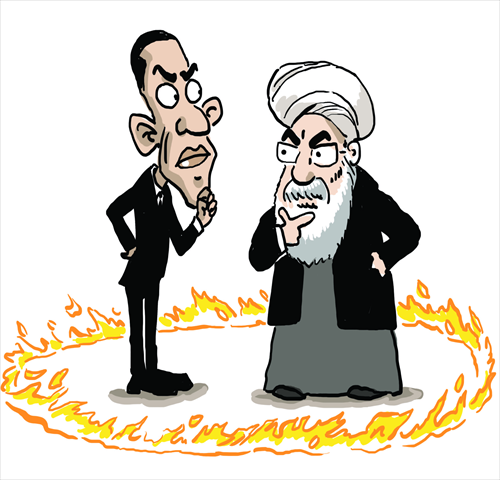Iraq’s sectarian crisis might aid strained Iran-US relations

Illustration: Liu Rui/GT
Baghdad, the capital of war-torn Iraq, is now being approached by rebel forces. The looming danger reminds people of the scene 11 years ago when US troops marched in the capital, after Saddam Hussein had already escaped.
Unlike the feeble anti-government forces that overturned the regime by attaching themselves to the US, this anti-government rebel group, known as the Islamic State in Iraq and Syria (ISIS), broke in full fury and displayed full ambitions to seize not only Iraq but also Levant on the eastern coast of the Mediterranean Sea. Washington, and the Iraqi regime it has nurtured for years, are confronted with a new round of siege.
The US has seen rotation between two ruling parties in recent years. Although US President Barack Obama leads has long espoused subtle criticism of the Bush administration's decision on the Iraq War, this only represents a difference in specific tactics between the two parties. Both have virtually the same fundamental objectives in the Middle East policy: fostering pro-US governments.
The Obama administration is only adjusting and replenishing Bush's policy toward Iraq and Afghanistan. However, the present scenario shows that this policy has yet to bear fruit.
The Taliban have staged a comeback and ISIS has been causing turbulence, posing a severe challenge to US interests in the Middle East and even to the new international order in which Washington plays a core role. This post-Cold War order was realized through an array of wars in Kosovo, Afghanistan and Iraq.
The current deterioration in Iraq makes the White House too hard to move any further amid the Middle East upheavals. Therefore, how to ensure the survival of the incumbent Iraqi government and the country as a whole without deploying more US troops there constitutes a conundrum for the Obama administration.
The wars in Afghanistan and Iraq have swept away the Taliban and Saddam, two old enemies of Iran, and built moderate pro-US governments. Since then, Iraq has inevitably leaned to Shiite Muslims who constitute an absolute majority of the population in sectarian politics. Meanwhile, Iran has maintained a rarely stable situation during the upheavals in the region. The worsening landscape across Iraq has also challenged Iran's domination in the area.
In Iraq, there are now several inter-tangled stakeholders: the US, Iran, the Taliban and its branch in Syria, the Iraqi government and Shiites, Sunnis, the Kurdish people and ISIS. Washington and Tehran have a high convergence of interests, which makes US-Iran cooperation on the issue of Iraq both possible and feasible.
With a deep-rooted tradition of pursuing pragmatism all the time, the US is adept at establishing quasi-alliances with its enemies at critical moments. And Iran has tided over the flurries of the Iranian Revolution and begun to seek peaceful and practical foreign policies. When all the internal forces in Iraq can barely deal with fierce attacks from ISIS, it is possible that Washington and Tehran might even join hands to offer assistance.
Owing to the intricacy of the history and the status quo in the Middle East, there are numerous links between the issue of Iraq and other hot spots in the region. Therefore, even if the US and Iran agree to cooperate with each other temporarily, it is still difficult to separate their brewing conflicts in other issues in the region. But needless to say, cooperation is always more conducive to thawing mutually hostile attitudes between two countries. Trust is always built on small steps.
The author is an associate professor at the Shanghai International Studies University and postdoctoral fellow of Berkley Center at Georgetown University. opinion@globaltimes.com.cn